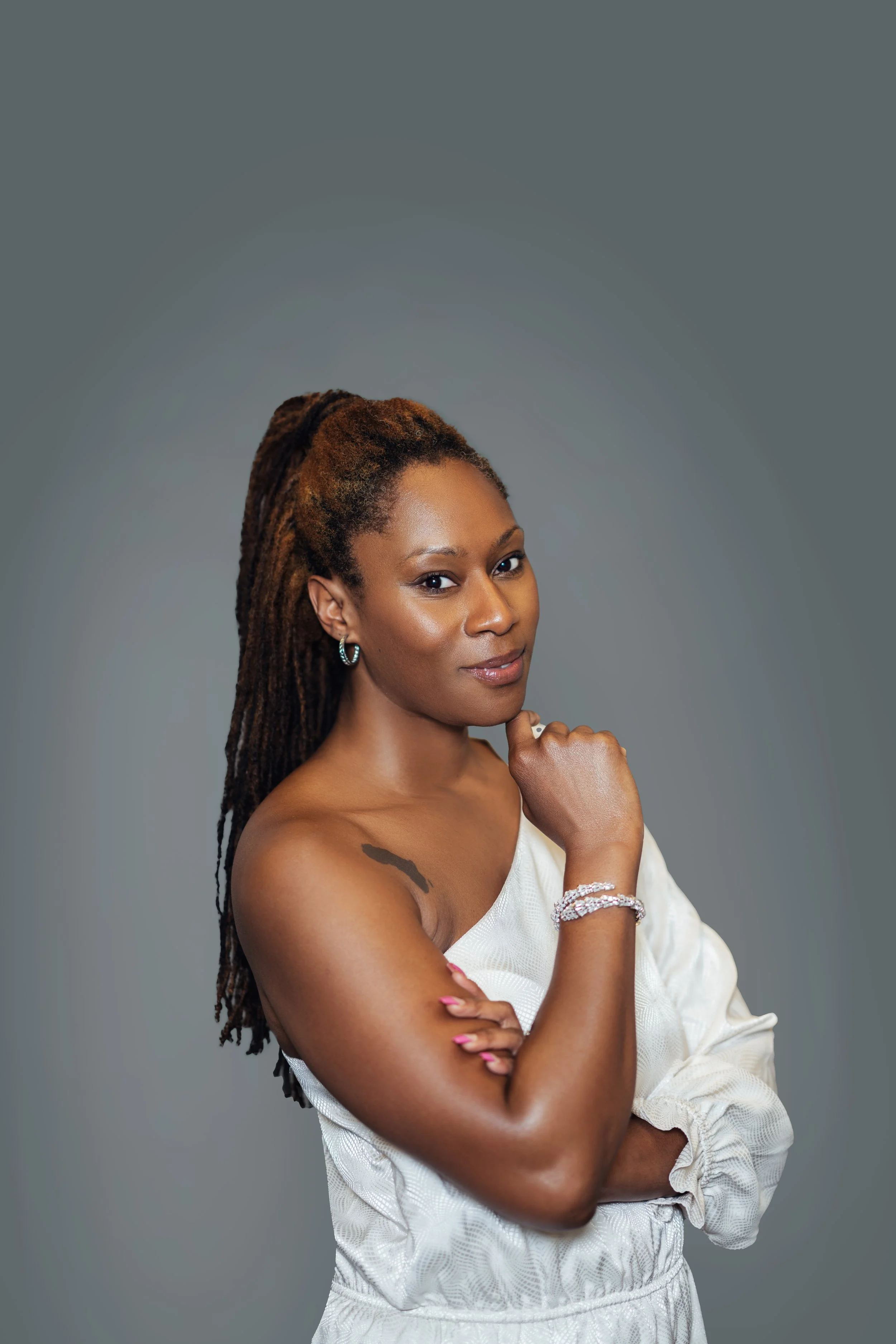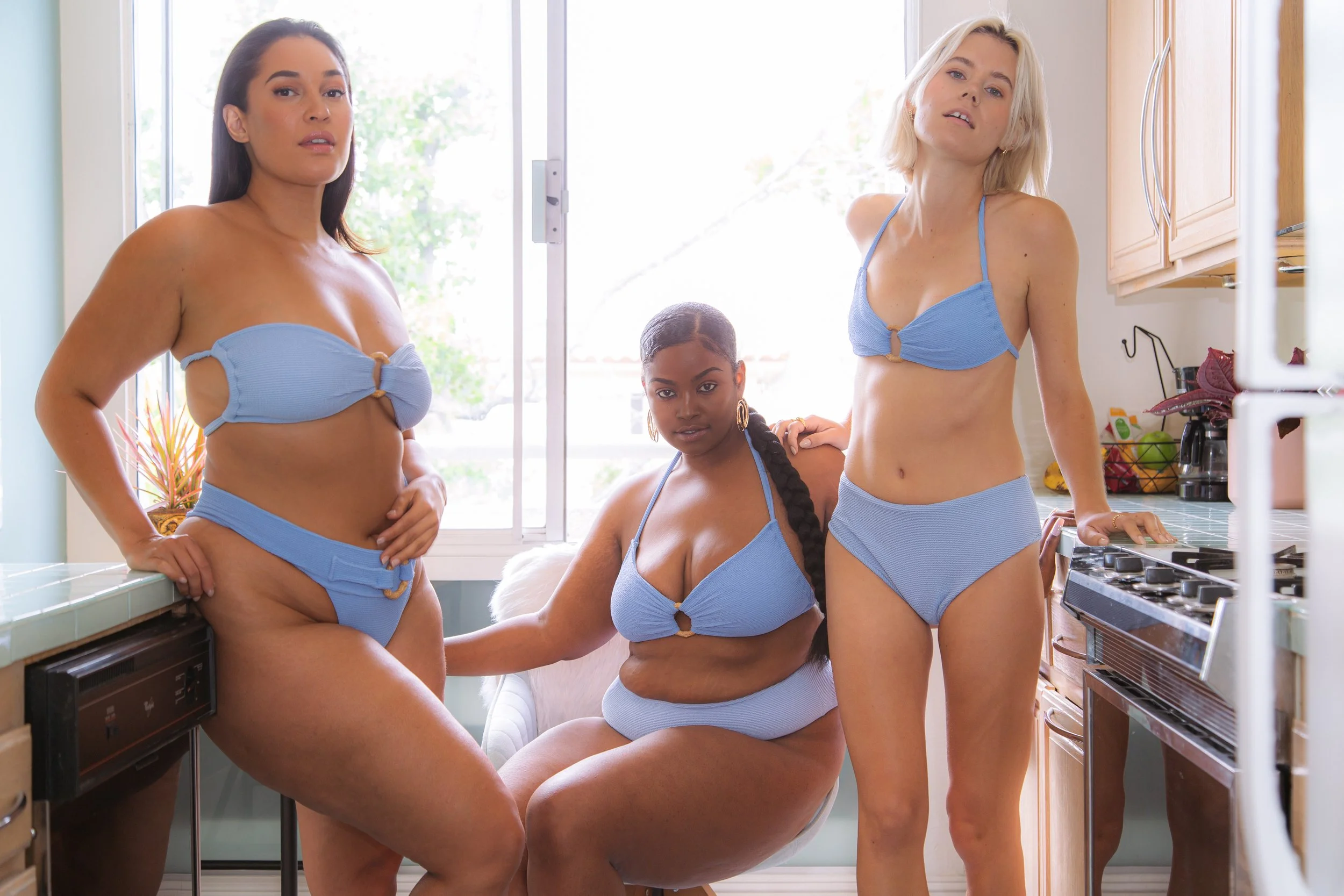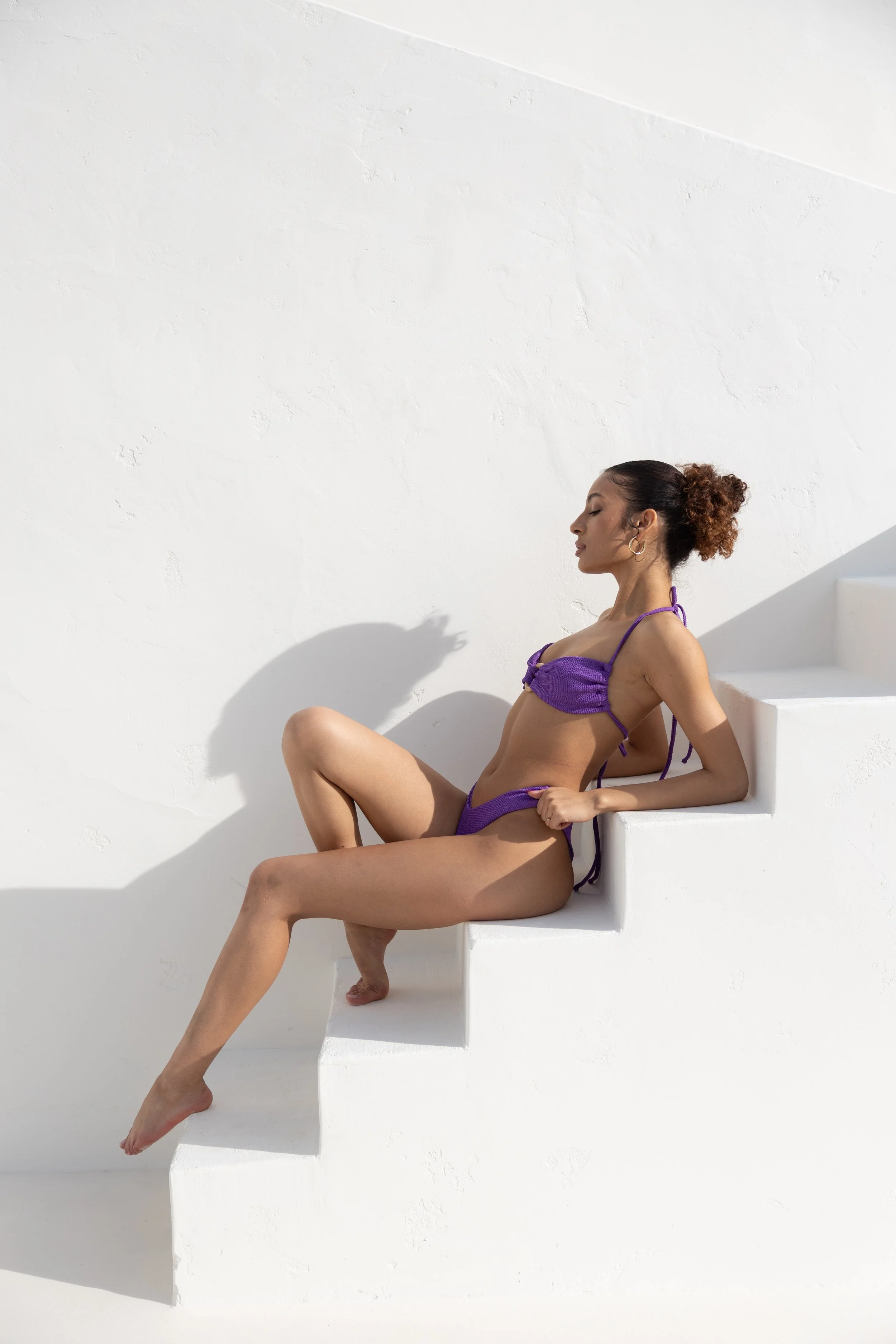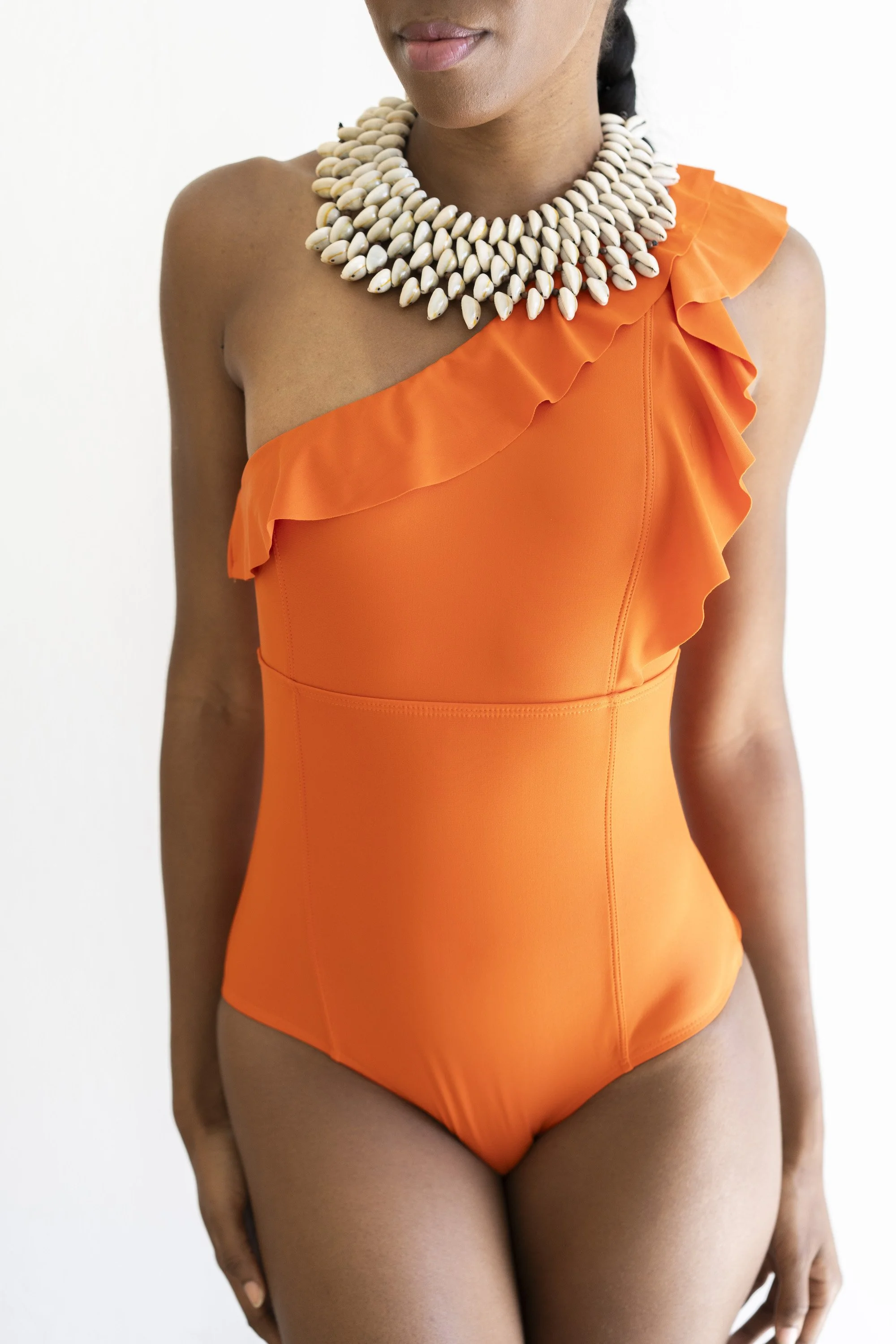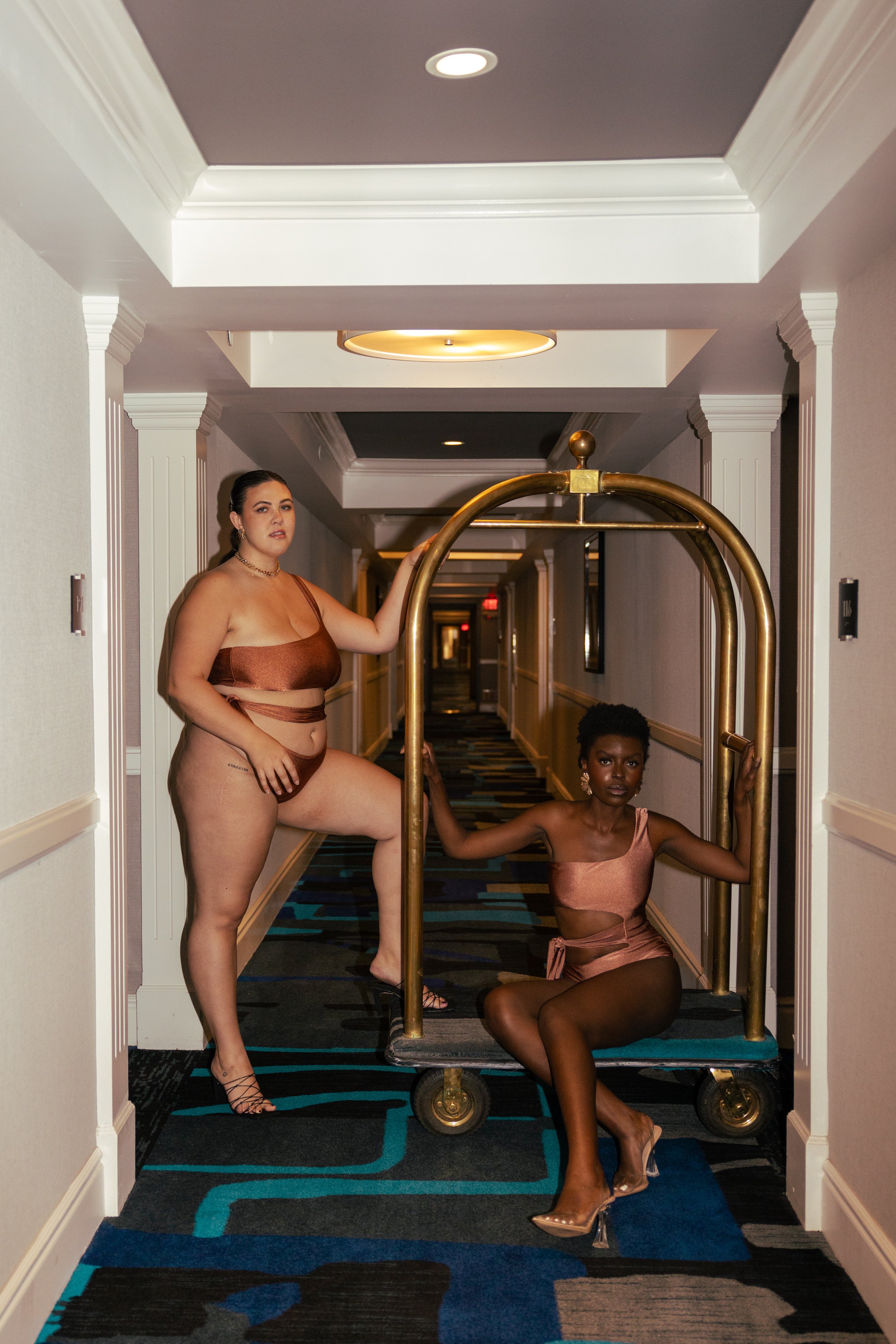
Tiffany Asamoah
CEO and Designer of BOLD Swim
With a passion for sustainability and a desire to create something better, Tiffany set out to design swimwear that not only fit well but also empowered women to feel confident.
Meet Tiffany.
Tiffany Asamoah is the CEO and Designer of **BOLD Swim**, a sustainable luxury swimwear brand known for its innovative designs and eco-conscious materials. With a background in corporate leadership, Tiffany founded BOLD Swim in 2017, driven by her passion for creating swimwear that empowers women with bold, vibrant styles and superior fit. Her designs focus on sustainability without sacrificing sophistication, making her brand a go-to for fashion-forward women worldwide. Featured in major publications such as *Vogue* and *Sports Illustrated*, Tiffany is a visionary leader dedicated to merging style with sustainability in the fashion industry.
What inspired you to start your company?
Tiffany Asamoah was inspired to start **BOLD Swim** after her own frustrating experiences with poorly fitting swimwear. She noticed that many swimsuits required constant adjustment and didn’t cater to diverse body types, leaving women feeling uncomfortable and self-conscious. With a passion for sustainability and a desire to create something better, Tiffany set out to design swimwear that not only fit well but also empowered women to feel confident. Her vision combined bold, minimalist designs with eco-friendly materials, filling a gap in the market for stylish, sustainable swimwear that didn’t compromise on comfort or fit.
Can you share a significant challenge or obstacle you've faced in the industry and how you overcame it?
One significant challenge I faced in the swimwear industry was breaking into a market saturated with traditional, well-established brands while trying to introduce sustainable practices. Early on, I struggled with gaining credibility and visibility for **BOLD Swim**, especially because many people weren’t aware of the impact swimwear manufacturing can have on the environment. Convincing buyers and customers to shift from mainstream products to eco-friendly options was a hurdle. To overcome this, I focused on education and authenticity. I leaned into storytelling, sharing not only the sustainability aspect but also my personal journey and the need for better-fitting swimwear that didn’t sacrifice style. Being transparent about the brand’s commitment to using eco-friendly materials, such as upcycled fabrics, helped build trust. I also leveraged press features and partnerships with well-known retailers to boost credibility. Ultimately, by staying true to my vision and using platforms that aligned with **BOLD Swim’s** values, I was able to carve out a space in the industry.
Who are your role models or mentors in the industry? How have they influenced your career?
In the fashion industry, my role models have been designers and entrepreneurs who have fearlessly pursued their vision while staying committed to sustainability and inclusivity. One key figure I admire is **Stella McCartney** for her dedication to eco-friendly practices long before it became a trend. Her ability to balance high fashion with sustainability has inspired me to ensure that **BOLD Swim** reflects both luxury and responsibility. Another influential figure is **Rihanna**. Through her Fenty brand, she redefined what it means to be inclusive in the fashion industry, offering diverse styles and sizes while staying unapologetically bold. Her fearlessness in taking creative risks has inspired me to embrace my unique vision as a designer. While I didn’t have a traditional mentor in the beginning, I sought out guidance from entrepreneurs and designers through their work and stories. They’ve influenced me to stay authentic, trust my intuition, and push for change, both in the design world and the sustainable fashion movement.
What advice would you give to your younger self or to our younger generations who are looking to break into the industry?
If I could give advice to my younger self or anyone looking to break into the fashion industry, I would say: **embrace your uniqueness and trust your instincts**. Don’t wait for external validation or for someone else to tell you that you’re ready. There will always be challenges and doubters, but your confidence in your vision is what will set you apart. Also, don’t be afraid to take risks and make mistakes—they are essential for growth. In an industry that moves fast, authenticity and adaptability are your greatest assets. Stay true to your values, whether that’s sustainability, inclusivity, or innovation, and let those guide your decisions. Lastly, build a strong network. Surround yourself with mentors, peers, and collaborators who inspire and challenge you. Success in this industry is not only about talent but also about resilience and the relationships you build along the way.
Fashion is often seen as a female-driven industry, yet leadership roles are still male-dominated. How has your experience been as a woman in a leadership position, and what changes would you like to see?
As a woman in a leadership position in the fashion industry, my experience has been both empowering and challenging. While fashion is often perceived as a female-driven industry, it's true that many leadership roles, especially at the executive and decision-making levels, are still dominated by men. This imbalance can create hurdles for women trying to lead with a different perspective or break the mold of traditional business models, such as prioritizing sustainability or inclusivity. Personally, I’ve had to overcome moments of doubt and push through situations where my voice wasn’t immediately valued or recognized. Early in my career, I found myself looking for validation from others, especially in a male-dominated environment, before realizing that my strength came from my unique vision and ability to connect with my audience. The change I’d like to see is greater representation of women—especially women of color—in leadership roles across all levels of the fashion industry. It’s essential to have diverse perspectives in positions of power to drive real innovation and inclusivity. I also hope to see more support systems for women entrepreneurs, from mentorship to access to funding, as breaking into leadership shouldn’t be the exception but the norm. Creating spaces for women to collaborate, lead, and succeed will ultimately push the industry forward in a more inclusive and creative direction.
Many women in business face the challenge of balancing personal and professional life. How have you managed to navigate this balance as a female entrepreneur?
Balancing personal and professional life as a female entrepreneur has certainly been one of my biggest challenges. Running **BOLD Swim** requires constant attention, from managing day-to-day operations to long-term strategy, while also making time for personal well-being and relationships. One thing I’ve learned is that **balance is not about perfection**, but about being flexible and intentional with your time. I prioritize by setting clear boundaries between work and personal time. This means being fully present in both areas—whether I’m in a meeting or spending time with family—and learning to delegate tasks when needed. It’s easy to feel like you have to do everything yourself, but allowing others to step in helps create the space to recharge. Another key element is self-care, which is often overlooked in the hustle of entrepreneurship. I make it a point to carve out time for activities that nourish me, whether it's exercise, reading, or simply unplugging. The balance is always evolving, and there are moments when one side requires more focus than the other, but staying adaptable has been crucial for me. I’ve also found support systems—both professional and personal—to be invaluable. Surrounding myself with a network of mentors, peers, and friends who understand the pressures of entrepreneurship has made all the difference.
Have you experienced any biases or stereotypes as a woman in your industry, and how have those experiences shaped the way you lead and run your business?
Yes, I’ve definitely encountered biases and stereotypes as a woman in the fashion industry, especially as a woman of color leading a sustainable swimwear brand. There’s often an assumption that women-owned businesses are more of a “passion project” rather than serious ventures, or that women in leadership might lack the assertiveness required to run a business at a high level. These stereotypes can sometimes manifest in subtle ways, like being overlooked in meetings or facing more scrutiny when making bold decisions. Instead of letting these experiences hold me back, they’ve shaped the way I lead and run **BOLD Swim** by strengthening my resolve to prove that women—especially women of color—belong at the forefront of innovation. I lead with confidence and transparency, making sure that my values, such as sustainability and inclusivity, are woven into every aspect of my business. I’m proud to bring a fresh perspective to an industry that often overlooks these priorities. These experiences have also made me more determined to create a brand that reflects the diversity and strength of women. I ensure that BOLD Swim empowers women not only through the products we create but also through the business decisions we make. It’s important for me to be visible as a female entrepreneur, so that others can see it’s possible to overcome these biases and thrive on your own terms. I want to continue challenging the narrative and advocating for more representation, whether it’s through the leadership team at BOLD Swim or the diverse body types and styles we promote.
What’s a misconception people have about being a female founder that you’d like to address?
One of the biggest misconceptions about being a female founder is that we’re driven purely by **passion** and not by the same level of strategic, financial, or operational goals as our male counterparts. While passion is certainly a key motivator, being a founder—especially in the fashion industry—requires an incredible amount of **business acumen, resilience, and risk management**. There’s also this idea that women-run businesses are often viewed as “lifestyle brands,” suggesting they’re smaller in scale or less ambitious. In reality, many female founders are not only creative visionaries but also deeply involved in the logistical, financial, and strategic aspects of running their companies. We’re making data-driven decisions, building complex supply chains, leading teams, and raising capital just like any other business leader. I’d like to address that misconception by highlighting that being a female founder doesn’t make the business any less **serious or scalable**. Women are building impactful, innovative businesses that are pushing industries forward, and our goals often include not just success for ourselves, but also a wider commitment to values like sustainability, inclusivity, and community building.
What strategies do you use to maintain your personal identity outside of your role as a business leader?
Maintaining my personal identity outside of my role as a business leader is something I consciously prioritize, especially since running a business can easily consume all aspects of life. One of the key strategies I use is setting **boundaries** between work and personal time. I make sure to carve out time for myself, whether that’s dedicating certain hours of the day to personal interests or simply unplugging from work-related activities to focus on my well-being. **Self-care** plays a big part in helping me maintain my personal identity. I engage in activities that I enjoy outside of the business, such as reading, exercising, or spending time in nature. These moments allow me to recharge and reconnect with who I am beyond being an entrepreneur. Another important strategy is surrounding myself with people who support me as **Tiffany**, not just the founder of BOLD Swim. My relationships with friends, family, and mentors help keep me grounded and remind me that I am more than just my career. I also actively engage in personal hobbies and causes that are meaningful to me, such as sustainability initiatives and mentorship programs for other women entrepreneurs. Lastly, I’ve learned to celebrate both personal and professional milestones. It’s easy to let the business define your success, but I remind myself to value achievements in my personal life, whether it’s personal growth or relationships, as these are equally important to my sense of identity.
What’s an unconventional or unexpected resource that has been pivotal in your entrepreneurial journey?
An unconventional yet pivotal resource in my entrepreneurial journey has been **community-driven feedback** from early customers and niche forums, especially in the sustainability and fashion space. When I started **BOLD Swim**, instead of relying solely on traditional market research, I tapped into online communities and sustainability-focused groups to understand what people really wanted from eco-friendly swimwear. These conversations were invaluable because they provided raw, unfiltered insights that larger studies or traditional surveys might overlook. Another unexpected resource has been **press features in smaller, niche publications** before breaking into mainstream media. These publications often have highly engaged audiences who are passionate about sustainability, fashion, or entrepreneurship. Being featured in those allowed me to build credibility and establish **BOLD Swim** as a trusted brand early on, which helped us grow organically and catch the attention of larger outlets like *Vogue* and *Sports Illustrated* later. Lastly, leveraging **personal experiences and frustrations** as a consumer has been an unconventional resource. My own struggles with poorly fitting swimwear were the catalyst for starting the brand, and by staying connected to my personal story, I’ve been able to create a product that resonates with others. That deep, authentic connection to the problem I’m solving continues to be a driving force behind the brand’s success.
How do you measure success for yourself outside of traditional metrics like revenue or growth?
For me, success extends far beyond traditional metrics like revenue or growth. While those are important, I also measure success by the **impact** I’m able to make in areas that align with my values. One of the key ways I evaluate success is through the **sustainability** of my business practices. Knowing that **BOLD Swim** is helping reduce waste by using eco-friendly materials and contributing to a more sustainable fashion industry is a huge marker of success for me. Another measure of success is the **relationships I build**—with customers, my team, and other entrepreneurs. When I hear feedback from women who feel empowered and confident wearing BOLD Swim, or when my team feels supported and motivated, I know I’m succeeding in creating a positive environment. Building a brand that reflects inclusivity and body positivity is incredibly important to me, and the personal stories from customers who resonate with that mission mean as much, if not more, than numbers on a spreadsheet. I also look at **personal fulfillment**. Running a business is challenging, but when I’m able to take a step back and feel proud of the journey, of overcoming obstacles, and of staying true to my vision, that’s success. Balance is another key factor—if I’m able to maintain a healthy personal life and feel grounded outside of work, that’s a sign that I’m managing success in a holistic way. Lastly, I measure success by the **legacy I’m building**. If I’m contributing to a shift in how the fashion industry views sustainability, inclusivity, and female leadership, I consider that a long-term success that goes beyond immediate financial metrics.
We believe in sharing the love. Tell us about other brands you are loving right now!
Madison/Savile, Veronica Tharamalingam , Jackson McCrea Whiskey

